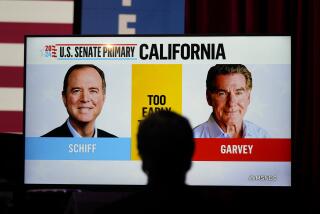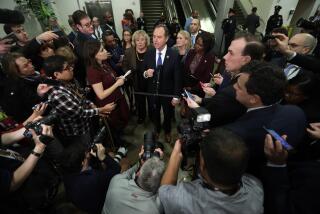Doubts About His Character Possible : Charges of Flip-Flopping Pose Threat to Gephardt
BROOKINGS, S.D. — A young woman who had just listened to Missouri Rep. Richard A. Gephardt speak had a question for the candidate: Would he comment on an editorial she read that said he has flip-flopped on everything except his desire to run for President?
For the last several months, such questions have dogged the Democratic presidential candidate. Each time he brings his campaign to another state, queries about flip-flopping, opportunism and inconsistencies are raised anew, occasionally by his audiences, frequently by his opponents and repeatedly by local reporters.
The charge of inconsistency now threatens to create doubts about his character, and in a campaign where the candidates share most of the same policy positions, the doubts could make the difference when voters go to the polls.
Hoping the charge can be ricocheted back at his opponents, Gephardt last week went on the offensive. He and his staff pored through the records of Tennessee Sen. Albert Gore Jr. and Massachusetts Gov. Michael S. Dukakis and came up with examples of shifts in their positions.
“Everybody in this race has changed positions on important issues,” Gephardt told reporters in Florida. “There isn’t anybody who hasn’t done the same thing. And frankly, I’d be embarrassed if I had been in public service for 12 years in the Congress and had voted exactly the same way on every issue, every time. That would be pretty stupid.”
Gephardt, running as an anti-Establishment populist, was until recently a moderate, mainstream Democrat, a Washington insider whose biggest asset, according to an admiring colleague, was his capacity to get the cooperation of both liberals and conservatives within the House Democratic caucus in Congress.
As he came closer to running for President, Gephardt began adopting more liberal positions, changes he now attributes to differing circumstances that demanded compromises and shifts to reach his goals.
Indeed, the record shows that Gephardt has traveled a long way since he first ran for Congress in 1976. “A Pro-Life Promise,” said Gephardt’s campaign advertisement in a newspaper that year. A grinning, youthful Gephardt, appearing with his wife and two children, pledged in the ad to work for a constitutional amendment to ban abortion.
By 1985 and 1986, when the chances of winning the Democratic Party’s nomination as an anti-abortion advocate looked slim, if not impossible, Gephardt was searching for a new position on abortion. He sought advice from political consultants.
“He was wondering aloud, ‘What should I do about abortion,’ ” recalled a consultant who conferred with Gephardt. The consultant, who asked not be identified, said he wonders whether the congressman is now “shaping his campaign less to do with his beliefs, than what he believes may be the most opportune way to get nominated.”
‘Troubled on Abortion’
Gephardt says now that he believes in freedom of choice although he remains personally “troubled on abortion.” In an interview, he said he changed for “the sake of civil peace;” the issue had polarized people, and no solution was in sight.
He said he sought advice from consultants because he “wanted to know the best way to say this so that people would understand what I felt.”
“But when I made this decision, I made it because I really was frustrated with the fact that what I was supporting was not achieving my goal . . . how do we help people avoid abortion.”
There were other shifts he also has had to explain. In 1978, he led a fight to kill a plan by President Jimmy Carter for hospital cost containment. But in 1984, he joined Sen. Edward M. Kennedy (D-Mass.) in backing a bill to put cost controls on medical health.
Earlier Plan Failed
The congressman said he joined with Kennedy only after becoming convinced that an earlier plan he had sponsored to provide more health care competition “was not completely doing the job.”
Gephardt opposed extending the period for ratification of the equal rights amendment although now he says he favors the ERA. He said in the interview that he opposed extending the ratification time because he thought such a move would put a legal cloud over the amendment. He tried later to reinstitute the ERA, he said.
In another shift, Gephardt favored federal regulation of nuclear power plants in the 1970s but switched in the 1980s to calling for more state influence. Any other position probably would have doomed a Democrat in New Hampshire, where residents have tried to block operation of the Seabrook nuclear power plant.
Again, Gephardt attributed the shift to changed circumstances. Previously, he said, the Nuclear Regulatory Commission had “good regulations” that required “local options on safety plans.” Under President Reagan, many of the regulations were rewritten and now no longer offer the same protections, he said.
As a candidate, Gephardt has most identified himself with the issue of trade. In every speech, he touts his proposed trade amendment, which would require the United States to try to end unfair trade practices abroad through negotiations and threats of wholesale penalties.
Wins Labor’s Backing
The plan enabled Gephardt to win strong backing from labor, a vital constituency for any would-be Democratic President. Polls also show that voters like this get-tough talk; it sells on the campaign trail.
But before 1987, Gephardt’s congressional colleagues say, he had no particular reputation as a trade expert. Did he pursue the issue to fulfill his presidential ambitions?
No, he says, he became active on trade when “the trade deficit really started to take off.”
“It became a much different issue than it had been before . . . ,” he said. “It became the issue of the day. It was truly a crippling economic problem, and I felt a big part of it was unfair trade practices.”
Gephardt uses the trade issue to appeal to workers and business interests who feel threatened by the torrent of foreign goods. Campaigning as the enemy of the Establishment and the status quo, he draws support from frustrated, alienated Americans.
‘Media Packaging’
So what if his career does not exactly square with his anti-Establishment message, his supporters say. “It’s media packaging in an effort to break him away from the other candidates,” said Rep. Leon E. Panetta (D-Monterey), a supporter of Gephardt.
Panetta brushes off Gephardt’s new populist image. “All Democrats have something of a populist edge by the fact they are Democrats,” he said. Gephardt simply “got there first, he developed a theme and he is effective at selling his position. The others are still struggling to find a label.”
Pollsters for Gephardt and his opponents say voters are paying so little attention to the race now that charges of inconsistency have yet to sink in. Many voters are still having trouble identifying the candidates.
A Gephardt aide who asked not to be identified said focus groups show that voters do not mind shifts on issues when they are presented as compromises necessary to achieve a goal. The “dark side,” the aide said, creeps in when voters see the changes as opportunism and stop believing the candidate will do what he promises.
“Of course you’re worried,” the aide said of the second possibility. “We worry about everything.”
The danger for Gephardt may lie in the future, when voters look for something to distinguish the candidates. “It is likely to become more of an issue,” said a spokesman for Dukakis.
Claims Specific Message
Gephardt defines the peril as one of voters thinking “you don’t have beliefs . . . that you are just looking for a political stance.” But he predicts he will move beyond the charge because his message is “very specific”: he has legislative proposals for trade and agriculture.
To the young woman who asked him in South Dakota about flip-flops, Gephardt replied: “The important thing to look at is what someone’s goals and principles are. I have strong goals and strong principles, things I want to achieve. But I believe you always have to be ready to change the way that you are trying to get there because that’s the right thing to do.”
The woman listened, but her expression remained skeptical.
More to Read
Get the L.A. Times Politics newsletter
Deeply reported insights into legislation, politics and policy from Sacramento, Washington and beyond. In your inbox three times per week.
You may occasionally receive promotional content from the Los Angeles Times.











